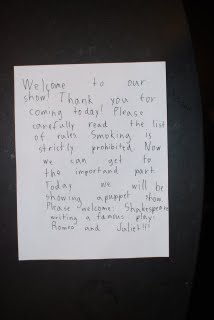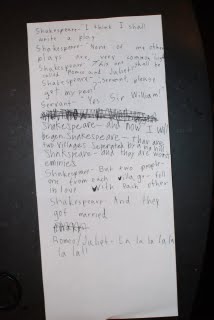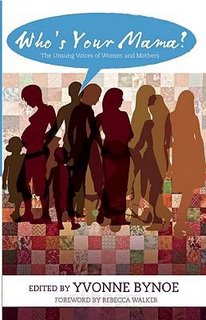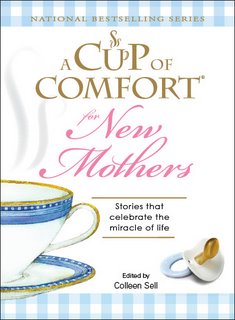I’m back!
My poor, long-neglected blog and blog readers, I am back and determined not to let Facebook status updates and tweets drain all my blogging energy away… anymore. I hope you’ll check in regularly.

Posts tagged ‘writing’
My poor, long-neglected blog and blog readers, I am back and determined not to let Facebook status updates and tweets drain all my blogging energy away… anymore. I hope you’ll check in regularly.
At lunch today, Eli started talking about the differences between Roald Dahl’s Fantastic Mr. Fox and Wes Anderson’s film version. We’ve only seen the movie once, but Ben has been reading the book to Eli in the car, and the conversation about the two different versions of the story shows no sign of abating. So Eli announced he wanted to write a sequel to the book, one that would come to a more exciting conclusion than Roald Dahl’s. I offered to type it up for him, not knowing that I have been harboring a budding Gertrude Stein, someone who will write the same sentence over and over and just when you think you know how the paragraph is going to end — bam! — surprises you with a new detail.
Or maybe it’s just that while I was typing, he was running circles around the living room. Anyway, here it is:
Once upon a time, there were three farmers. Their names were Bunce, Boggis and Bean. They were trying to catch a fox, but he was too clever. So they were waiting at the fox’s hole so when the fox came out, they could shoot him. But the fox was too clever. Bunce was a geese and duck man. Boggis was a chicken man. Bean was a turkey and apple man. Let’s go back to the story. So, each night Fantastic Mr. Fox would say, “What should it be now, dear? chickens from Boggis, ducks and geese from Bunce, turkey or apple from Bean?” And then she would say, “A turkey from Bean, or, a chicken from Boggis, or, a geese from Bunce.” So after she said what she wanted, Mr. Fox would go out of his hole, sniff the air, and go to fetch what she wanted. The farmers did not like things getting stealed from them, so each night, they’d go down to the hole with their shotgun and wait. But the fox was too clever for that! So each night he would look around or sniff around and then he would go to whatever Mrs. Fox wanted and help himself. Then he would come back and get dinner ready and then they would eat dinner. Then they would go to sleep, wake up, Fantastic Mr. Fox would say, “What should it be now, dear? A chicken from Boggis, a geese or duck from Bunce, or some cider or turkey from Bean?” Then Mrs. Fox would say whatever she wanted and then Fantastic Mr. Fox would go out of his hole and help himself. The farmers had a bad idea. They would go in front of their farms, waiting for the fox. But then the fox went into the back door and they saw the fox go into the back door and they hid their gun in the back door and then Fantastic Mr. Fox would go into the front door and help himself. The farmers did not like that so they tried going back to his hole with their shotguns. And then it turned dark and Fantastic Mr. Fox said, “What would you like, dear?” And Mrs Fox would tell whatever she would like. And Mr Fox would dig a tunnel to solve the problem, a pretty big tunnel and then come out, do you know why? because if he came out the regular way he might get shot, so he dug a little tunnel where the farmers aren’t. So he would come up, and help himself. And the farmers saw his tunnel so they moved to that tunnel. He would come back out the regular tunnel and then fix up dinner and after dinner they would go to sleep. Then after they went to sleep, morning would come, so they would wake up. Fantastic Mr. Fox would say, “What should it be now, darling?” So Mrs. Fox would say whatever she wanted and then Mr. Fox would help himself. Then he would come back, fix up breakfast, eat it, have a little rest, then go get lunch. After lunch, the one fox would have a little play, then dinner arrived. Mr. Fox would say, “What should I get? A chicken from Boggis, a duck or geese from Bunce, or a turkey or jar of cider from Bean?” Mrs Fox would say what she wanted and then they would fix up dinner, go to sleep, do another day, next day they would wake up, get breakfast, eat breakfast. The little fox would have a play, get lunch, the little fox would have some play, then dinner arrived. They would eat dinner, another day passed, they would wake up, have breakfast. The little fox would have some play, eat lunch, the little fox would have some play, eat dinner, another day. [“It’s a long chapter,” noted Eli, “to get you into the story. You might not keep reading if it was just, “Once upon a time there were 3 farmers. Next chapter.” Fair enough.]
Next Chapter
They would get breakfast. The little fox would have some play, then lunch arrived. After lunch, the little fox would have some more play, dinner arrived. Eat dinner, go to sleep, another day passes.Another Chapter, Chapter 3
They would wake up, get breakfast, the little fox would have some play, then lunch arrived. They would eat lunch, the little fox would have some playtime, then dinner arrived. They would eat dinner, another day passes. Wake up, eat breakfast, the little fox would have some play, then lunch arrived. They would eat lunch, the little fox would have some more play while Fantastic Mr. Fox would read the newspaper while Mrs. Fox would clean dishes.Chapter 4
Dinner arrived! They would eat dinner, go to sleep, another day would pass. They would wake up, they would get breakfast, eat breakfast, the little fox would have some play, then lunch arrived. They would eat lunch, the little fox would have some play, then dinner arrived.Chapter 5
They would wake up, get breakfast, eat breakfast, the little fox would have some playtime, then lunch arrived. They would eat lunch, the little fox would play while Fantastic Mr. Fox would read the newspaper and Mrs. Fox cleaned dishes. Then Fantastic Mr. Fox would fetch dinner, then they ate dinner, the little fox would have ten minutes of playtime and go to sleep. Another day passes.Chapter 6
So they would wake up, get breakfast, the little fox would have some playtime, Fantastic Mr. Fox would get lunch, the little fox would have some playtime.Chapter 7
To be continued…
Depending on the company, Ben and Eli play lego, or rocket ships, or build forts, or draw, or do puppet shows. On Saturday, their puppet show friends came to play and, as usual, Ben and his fellow second grader took the lead, assigning smaller roles to the younger siblings. The boys wanted to perform a play by Shakespeare, but then realized that they don’t really know the plots of any of Shakespeare’s plays. So they went to Plan B, starting with an announcement from the MC:
 Welcome to our show! Thank you for coming today! Please carefully read the list of rules. Smoking is strictly prohibited. Now we can get to the important part. Today we will be showing a puppet show. Please welcome: Shakespeare writing a famous play: Romeo and Juliet!!!
Welcome to our show! Thank you for coming today! Please carefully read the list of rules. Smoking is strictly prohibited. Now we can get to the important part. Today we will be showing a puppet show. Please welcome: Shakespeare writing a famous play: Romeo and Juliet!!!Next, they produced a script:
 Shakespeare: I think I shall write a play.
Shakespeare: I think I shall write a play.
At this point, Eli apparently became disgruntled about his role, and expressed his dissatisfaction:
That seemed like a good time to pause for dinner. The quartet of kids gets together again next weekend, and it’ll be interesting to see how the scripts — on stage and off — develop.

The hardest aspect of editing Mama, PhD was not editing the selections, nor working with the publisher to fine-tune essays, nor copyediting, nor even coordinating all of this work with a coeditor living 3,000 miles away who had two (now three!) kids of her own. No, I think really the hardest part was actually getting the essays. We sent out a call for submissions to our friends, and asked them to send it to their friends; we published it on list-servs and websites and broadcast it as widely as we knew how. It wound up in places that we didn’t even know existed, like the Women and Crime mailing list. But still, many of the essays came from women of similar backgrounds and in similar disciplines as ourselves. For Mama, PhD this wasn’t a deal-breaker: the collection winds up accurately reflecting the diversity of women in higher education. Still, I know there are more stories out there that we didn’t manage to uncover, and I’ll always wonder how we might have found them.
Yvonne Bynoe, who edited Who’s Your Mama: The Unsung Voices of Women and Mothers, found an amazingly diverse group of women to contribute to her anthology. The women are different races and ethnicities; they are single, widowed, divorced and partnered, gay and straight, mothers and childless, at home with their kids and working outside the home. The women are not all professional writers, but they contribute deeply-felt stories which are powerfully told.
Mary Warren Foulk’s piece, “Which One’s the Mother?”, beautifully traces her complicated road to lesbian motherhood, and I loved Kathy Bricetti’s sweet essay, “The Baby Bank,” about going with her partner to a sperm bank, way back in 1992.
Christine Murphy is resisting friends’ and family pressure to jump on the “baby train” in “Mommy Maybe…” — and wondering if she’s making the right choice. Liz Prato writes poignantly of her decision not to have children in “Is Life Without Kids Worth Living?” With a mother who died at fifty-eight and two aunts who passed away in their forties, she feels that “knowing the parent-child relationship can come to such an abrupt end has shut down our desire to have kids.”
In “The Mother I Always Wanted,” Robin Templeton describes how her pregnancy makes her finally confront the reality of her own troubled mother; sitting on an airplane on the way back home, she writes, “I fanned myself with the laminated safety instructions, closed my eyes and a neon warning scrolled behind them like an interruption from the Emergency Broadcast System: Beep. This is a test. Beep. You are your mother’s chid. Beep. Your baby will be raised by a woman raised by your mother.”
Eileen Flanagan also addresses the legacy of difficult mothering in her essay, “A Pellet of Poison: I Don’t Want to Feed Racism to My Children the Way My Mother Fed It to Me.” Untangling what she was taught from what she wants to teach her children, she searches out slave narratives, abolitionist histories, novels and songs; she writes, “In the realm of race, I can also face the heat of my family history, sweating out whatever I’ve absorbed and teaching my children to do the same. Stories are like saunas that can help draw the poison out of us.”
And I loved Lisa Chiu’s essay “Ching Chong!” which hopes her son won’t hear the playground taunt that haunted her childhood: “Nico’s classmates haven’t yet asked him where he’s from. But when they do ask–and they will–I hope he will answer the question with clarity and confidence. I hope he will respond in a way that educates people, informing them not just of his own cultural background but of a world that is multi-hued, complex, and complicated.
“It took me years to come up with my own succinct answer to the question, replying that I’m a second-generation Taiwanese American woman who was born in Canada and raised in Cleveland. It took a long time for me to learn how to define myself. Now, it is time for me to guide my son along his cultural identity journey. I know where we’re from. And I’m gaining clarity in knowing where we’re going.”
I like these essays for asking good questions rather than presuming to have all the answers. These are women in the midst of journeys, and it’s interesting to follow along with their thinking.
Want to read this book? Leave me a comment by Saturday, May 30th, and I’ll choose someone at random to receive my advance galley.
My fabulous writing group, The Motherlode Writers, is reading at Book Passage on Sunday and we’d love for you to join us!
Motherlode is a Berkeley-based community of mother-writers. We work in a wide variety of genres, including essay, memoir, poetry, and fiction. Our work has been published in print and online outlets including The New York Times, The Washington Post, Literary Mama, a variety of anthologies, and numerous other journals, blogs and ‘zines. Our recent books include Sybil Lockhart’s Mother in the Middle: A Biologist’s Story of Caring for Parent and Child (Touchstone/Simon & Schuster, 2009); Sophia Raday’s Love in Condition Yellow: A Memoir of an Unlikely Marriage (Beacon Press, 2009); and Caroline Grant’s Mama, PhD: Women Write about Motherhood and Academic Life (Rutgers University Press, 2008). Readers also include Marian Berges, Ursula Ferreira, Rebecca Kaminsky and Sarah Kilts.
Bring the kids and join us on Mother’s Day for a celebration of motherhood and writing!
Sunday May 10th 2 – 3 p.m.
Book Passage
51 Tamal Vista Blvd.
Corte Madera, CA 94925
(415) 927-0960
I once tried to write an essay in which I compared my writing to the proverbially ignored third child, but the analogy didn’t seem to hold up and I shelved the piece. And now it’s out of date; I can’t claim that my writing isn’t getting much attention, and I’m grateful for that. But now this blog is becoming that third child — the independent oldest, left alone for long periods while I tend to its younger blog siblings.
At Learning to Eat, I’ve been giving my muffin tin a workout, and offer recipes for blueberry, banana, and vegan banana muffins, as well as pizza. Browse around and you’ll find a balanced meal or two (and the drink to accompany them).
At Mama, PhD, I’ve been invited to participate in a reading at UC Riverside, and posted a video of our recent event at the University of Richmond. So go check them out and I’ll try to update here over the weekend.

I was delighted today to receive my contributor copy of A Cup of Comfort for New Mothers, in which my essay “The Cookie” has been reprinted. My story is about a particularly trying day of new motherhood and how a little old-fashioned advice and infant Ben’s own ingenuity saved the day.
My Literary Mama colleagues Amy Hudock and Kristina Riggle also have essays in this collection, which is a terrific group of moving, honest, and unsentimental essays about new motherhood. Check it out!
The conference so far:
One blood orange margarita at Frontera Grill
Two meals with great writers and fans of Mama, PhD: Elline Lipkin and Elizabeth Coffman
Three sighing, meaningless invocations of the word “craft” (in one panel!), as in
Question: What makes this writing stand out?
Answer: Well [long pause], I’d say, really, well, it’s just … the craft.
Four (out of five) speakers on the Fictionalizing the Family panel who don’t have children, and so advised “Write as if everyone you know is dead.” Kill your darlings, indeed! I can’t write like that.
Five speakers on the fabulous Writing as Parents panel — Kate Hopper, Jill Christman, Shari MacDonald Strong, Sonya Huber and Jennifer Niesslein — who spoke much more relevantly to me. I loved all their presentations, and am thinking this morning particularly about Sonya Huber’s anecdote expressing the whiplash of talking with small children. Her son asked her one day, “How many days until the day we die?” When she responded, “We don’t know,” he asked, quite reasonably, “Why don’t we ask the one who made all our parts?” And then, as she was still struggling with her answer to that, he tossed her a softball, “How do you spell Chewbacca?”
Six more meals until I head home.
Seven readers at tonight’s Literary Mama reading at Women and Children First bookstore; if you’re in Chicago, please come!
Eight panels today that sound interesting to me, so many that I may not make it to any.
Nine times I laughed out loud during Art Spiegelman’s brilliant, funny, keynote talk, a swift survey of comic strips and his place in them.
Ten minutes in the bookfair before I was weighed down with free chocolates, pens, and subscription forms.
There’s a little something for everyone at Literary Mama this week. Can’t stop thinking about the election? Read Children’s Lit Book Group for some books that will get even the youngest readers involved, and The Maternal Is Political for a thoughtful exploration of one mama’s political journey. Sick of thinking about the election? Then read about how Doing It Differently came to take one big step, or follow as Me and My House takes many steps.
In Literary Reflections, you know you all do it — now read about how Heidi Scrimgeour writes in the shower. And finally, I wanted to learn about how my friend and former LM columnist Gail Konop Baker writes anywhere, in addition to mothering her 3 kids, running, and dealing with cancer. So I interviewed her; read our conversation here.

OK, I realize I’ve been ignoring the blog a bit lately, but it’s been a busy time spreading the news about Mama, PhD. So I’m delighted to stop talking about that book (just for a moment) to announce the publication of my essay, “Wonderful Life,” in the new anthology, The Ultimate Christmas (Health Communications, Inc). The book is one-stop Christmas shopping, with essays, stories, recipes, pictures and advice on how to get through what can be a stressful holiday without losing sight of the magic. I’ve never shared space in a book with a martini recipe before, and I am well pleased. My piece is based on my Literary Column on It’s A Wonderful Life; here’s an excerpt:
Christmas Eve, 2002
It’s my first Christmas as a mom, and I as sit rocking infant Ben to sleep in the darkened room, I realize that the ubiquitous Christmas telecast of It’s A Wonderful Life (Frank Capra, 1946) is flickering on the ancient television. The sound is muted, but I remember the dialogue. George Bailey (Jimmy Stewart) has just learned that Uncle Billy misplaced the day’s deposit, and despite sacrificing his whole life for the Building & Loan, George is ruined. He can’t listen to his wife Mary cheerfully prattle on about their daughter Zuzu’s cold. He rages about the money spent on the doctor, their money-pit of a drafty house: “I don’t know why we don’t all have pneumonia!”
Ben stirs in his sleep and cries out. I hold my breath as I adjust his IV, which has tangled around my arm and pulled taut. I touch my lips to his sweaty head and he relaxes back into sleep. I exhale, relieved to have avoided another cycle of the anguished cries that raise his fever and bring the nurses running with another round of invasions.
We have pneumonia.
Go pick up a copy of The Ultimate Christmas to read the rest!